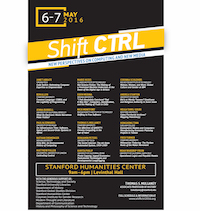History of Computer Dating
July 23, 2016 #media
National Geographic has produced an excellent series on the history of sex and sexuality. As part of that series, they ran an episode on sex and technology. If you watch closely, you can see me talking about the history of computer dating.
I first developed this history for a lectured called “Love and Sprockets” that I developed for my I202: Introduction to Social Informatics course. It turns out IU holds a special place in this history.
University Trustee Teaching Award
April 28, 2016 #teaching
I am pleased and honored to have been awarded the 2015-2016 Indiana University Trustees Teaching Award. Many thanks to my students, teaching assistants, and colleagues who helped make this possible!
SHIFT-CTRL at Stanford
April 20, 2016 #research #media
In early May I will speaking at the SHIFT-CTRL conference at Stanford University. The conference, which is being convened by Tom Mullaney and Ben Allen is aimed at exploring new directions in scholarship on computing and new media that “engages meaningfully with questions of gender, culture, language, ethnicity, and class.” The scholarly line-up that they have arranged is impressive. This is an exciting way to end the spring conference season. I will be presenting on my global environmental history of computing project.
The Dirty Bits Traveling Show
April 11, 2016 #research #media
I have been traveling and talking about my new environmental history of computing project a fair bit recently. I am particularly excited about my forthcoming talk at the University of Nevada, Reno. Among other things, Nevada is the home of the Chemetall Foote lithium mine and the still-under-contruction Tesla Gigafactory. The geo-politics of lithium carbonate (as well as of other mineral central to the digital economy) is one of the topics covered in the Dirty Bits book.
The Art of Software Maintenance
April 05, 2016 #research #media
It often surprises my students when I tell them that as much as 60-80% of all software development effort (time and money) goes into software maintenance. After all, software is not a technology that we think of as “breaking down” — at least in the conventional sense of wearing out, needing parts replaced, or requiring a new coat of paint or some additional lubrication. Nevertheless, since the mid-1960s software maintenance has loomed large in the minds (and budgets) of any organization using or developing software systems.
The problem of maintenance is a ubiquitous but neglected element of the history of technology. All complex technological systems eventually break down and require repair (some more so than others), and, in fact, as David Edgerton has suggested, maintenance is probably the central activity of most technological societies.1 But maintenance is also low-status, difficult, tedious and risky. Engineers and inventors do not like maintenance (and therefore generally do not do maintenance), and therefore historians of technology have largely ignored it.
This coming weekend I will be attending The Maintainers: A Conference, a meeting of historians, social scientists, artists, activists, and engineers, all of whom “share an interest in the concepts of maintenance, infrastructure, repair, and the myriad forms of labor and expertise that sustain our human-built world.” I will be talking about the history of software maintenance, but the conference program is full of fascinating papers and presentations.
If you happen to be in the vicinity of NYC this weekend, the Stevens Institute of Technology is going to be the place to be!
Update: The public response to the Maintainers conference has been extraordinary and international. The organizers Lee Vinsel and Andrew Russell published an essay in Aeon that subsequently got reported on and reposted across the Internet. The conference has also been covered internationally in the French newspaper Le Monde and on Australian national radio.
-
Edgerton, David. 2007. The Shock of the Old: Technology and Global History Since 1900. Oxford: Oxford University Press. ↩
Hipster HoC @ SXSW
February 15, 2016 #media
On March 12 at the South by Southwest festival in Austin, TX, I will be presenting as part of a panel on the untold history of women in computing. If you happen to be in Austin for SXSW, come see our panel Fact Check: Tech Has Never Been Just a Man’s World at 3:30! The venue is sponsored by Capital One, and is located at Antoine’s.
Also, one of my fellow panelists will be the documentary film maker Robin Hauser Reynolds of the fabulous CODE: Debugging the Gender Gap, which will be screening at the IU Cinema at 7:30 on Monday, March 7. Robin will be there and will be answering questions afterwards, so this is an excellent opportunity!

